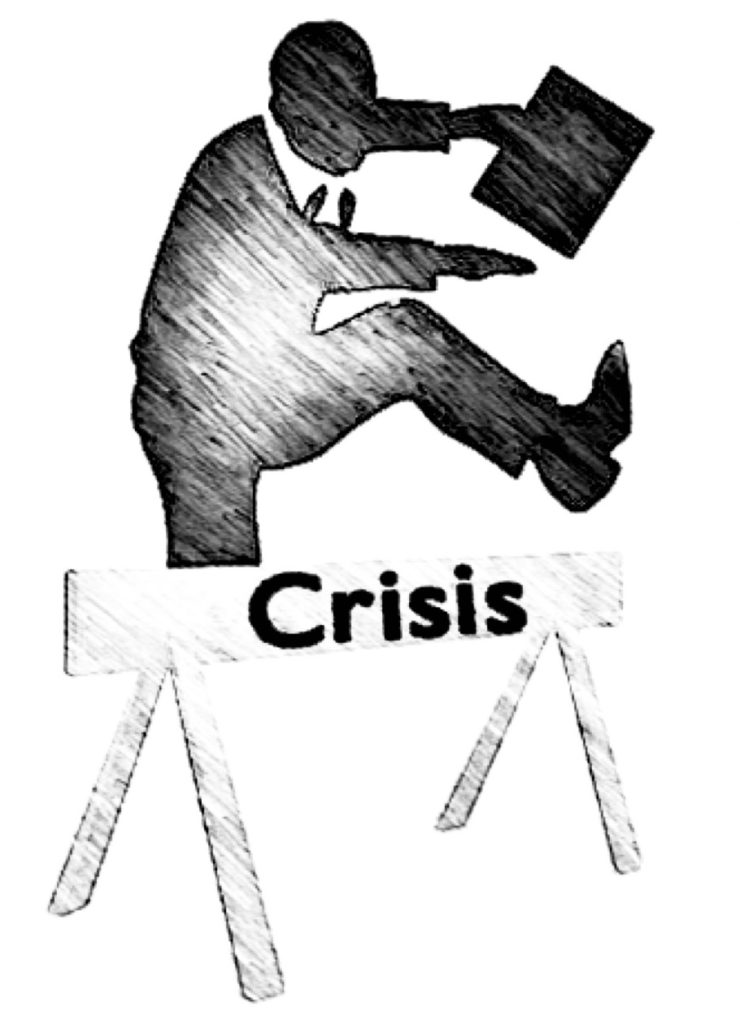This recognition may sound abstract and trivial. But it’s valid — and important. In crisis, the best advisers definitely are honesty and ethical behaviour, plus the legal consequences. The right type of crisis manager and crisis team is a basic prerequisite.
Watching different crisis cases being managed at present, several thoughts come to mind. When called to help deal with incidents and crises, one sees why crises happens in the first place and too frequently is coped with sub-optimally. I try to make a few important points in this article.

The dictum is relevant in both cases: whether one has to manage a crisis — like a pandemic or an economic crisis — or one has to cope with a self-made crisis — like a scandal or accident.
There are always three dimensions in observable reality, also here. One concerns people who are affected directly, experiencing physical or material damage. The other dimension includes the persons and the organisation (or organisations) responsible for the incident, and/or bound to deal with it, often accountable to owners and responsible for employees. The third dimension is the outside, comprising relevant authorities, the justice system, the public, and the media. The latter is split into groups which are directly involved in the case and those who are observing and may take longer-term influence.
The Stakeholder Principle
Each of these groups has different perceptions and views and — most importantly — different interests, rights and legal obligations. Hence the denomination “stakeholders“.
From the perspective of the crisis originator and/or crisis manager, in situations of incidents or crises, it’s indispensable to adhere to the stakeholder principle.
In many cases, when incidents become a crisis or when a crisis seems to be managed sub-optimally, one reason frequently is that the legitimate interests and rights of stakeholder groups are not considered enough, or not at all.
Time and again, one witnesses that responsible persons take a position of self-centredness. They are exaggerating their role as doers. And they become full of self-pity when things get difficult and criticism arises. (It’s really “and“: they are in both psychological states, outwardly switching between them.)
The top people should not give in to the reflex that they should, or were obliged to, jump in as the crisis manager. There are many good reasons connected with functional and legal Incompatibilities why top managers cannot act freely enough as crisis managers while escalation levels are taken away. Cases are legion in which the idea cost mighty CEOs their heads.
What one needs for that position, or as a minimum with a significant role in the team, is a person (with a stand-in) outside the leadership who has both a full overview over the stakeholder landscape and good insights into each of the very differently natured stakeholder groups.
This is necessary because nowadays, out of their experience and own pressures, highly engaging, nervous and skeptic, well-informed, mutually networked stakeholders immediately march up to make demands or try to take charge. Stakeholder “management“ or relations are a strategic task (that is too often underestimated or overlooked).
Broad focus on Fairness
With the self-centred approach it’s actually very hard to manage a crisis successfully. Whereas crises can never be “perfectly“ managed; compromises are always necessary. This is also a matter of perspective — one can say:
A crisis is in total managed perfectly, when for key stakeholder group the impression is that the outcome is below perfect and that this is true for all groups.
If the crisis managers focus on themselves and forget about the stakeholders or ignore them, then the thing will not go well and everyone will be dissatisfied in the end, including the crisis managers. If one believes one can be anyone’s hero as a crisis manager this is utterly naive.
So better to play it smart from the start. That means considering all stakeholders and managing the crisis as a compromise process between the different legitimate interests. One can then call this ethical behaviour.
To be a crisis manager means serving others.
Real leadership personalities and decent politicians do not put themselves and their power and election interests first, especially not in a crisis.
The right to Truth
One absolutely critical right of all stakeholders is the right to truth.
Of course, also truth is relative. But it’s not an option to say the untruth, to consciously lie or purposely twist the truth (called “spin“ in the doubtful practice of PR).
Saying the truth includes being open about what one doesn’t know. There are always known unknowns as well as unknown unknowns — as a crisis is a complex process with high unpredictable dynamic and chaotic and exponential tendencies. Nobody can seriously expect perfection, also from that perspective.
Only weak responsible persons try to make it look like they know everything and have everything under control. This is simply not believable, especially in a crisis.
o better to play it smart from the start. Here, that means saying true things (not necessarily all things) and being straightforward about what one doesn’t know and cannot know. It also means being self-critical and honest about decisions that have proved problematic later.
To admit one has erred in fact increases credibility and trust.
Criticism will always occur and be at least partly adequate. Good crisis managers and real leaders accept this and don’t denigrate criticism as untrue, unethical or insult to majesty. Crisis management must not be misused for a PR show or self-magnification exercise.
Law and liability
Respecting the rights of stakeholders and the right to truth certainly does not mean that crisis managers are forced to expose themselves to legal risks.
We live in a society that is ruled by law which is generally positive, even if sometimes legal regulations can be imperfect, excessive or unworldly. So it is fair to allow managers to have to comply with the law.
It’s important that it is taken into account that crisis managers need to manage their legal risks and their liability.
Legal regulations set a limit to what a crisis manager can do and say. This has to be accepted. What is correctly done under the rule of law has to be considered as ethical. This is true even when for this reason the truth is not being said, meaning not the full truth, rather than the untruth.
Fairness and honesty towards the stakeholders are imperative.
In sum, the best guidance for crisis management is provided by ethics and law, and the best success is verifiably achieved when stakeholders are respected and the principles of fairness and honesty are honored.
The needed crisis manager and crisis team
Further, it’s important to take a look at the right type of crisis manager.
In crisis management, one is well-advised to involve experienced crisis managers, legal experts and ethics-philosophers — and to follow their aggregated advice.
Today, crises are often totally different from the “normal abnormalities“ one has been used to. In many cases, they are non-local, non-physical, non-single-event, systemic, complex and enduring with crises in crises. Think of the current main risks like compliance issues and crime cases, cyber attacks and confidentiality breaches, problems like violations of human rights, equality and bad personal treatment, social media warfare, product recalls and boycotts, and the like.
In contrast, the classical crisis manager hass come either from the safety and security, local accident or from the risk management side. The first area is also the one in which organisations are well prepared, alone due to legal provisions and certifications.
In view of the contemporary main group of crises cases, the ideal crisis manager is oner who combines a few components: crisis-testedness with the necessary personal character, stakeholder competence, legal understanding, high ethics, and a serving mentality. Rather than in local emergency scenarios, in a real team player, empowering the crisis team, is better than the old commander type, but still willing to take decisions and responsibility.
The team should be organised and authorized as a special organisation in the organisation for special situations. It needs to contain necessary expertises and organisational functions and areas as well as operative insight and access. A personality suitable for crisis and voluntary willingness, besides skills, have to be key aspects for the nomination.
The crisis team in most organisations will, and can, be not a permanent, waiting but an ad-hoc unit. Regular efforts for team building, resources and infrastructure, and training are self-evident.
If one knows there is a good crisis manager as part of a good crisis team at work, one can sleep well — and dispose of useless in the specific case crisis procedures and manuals.

